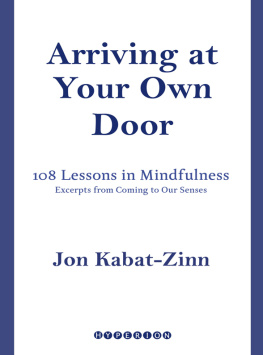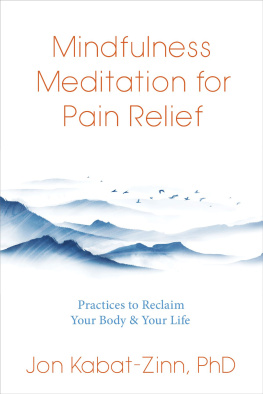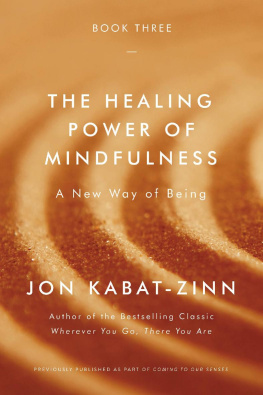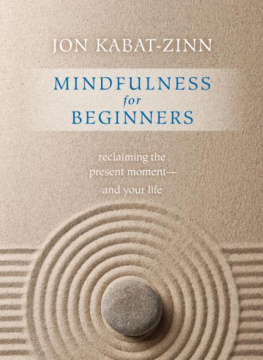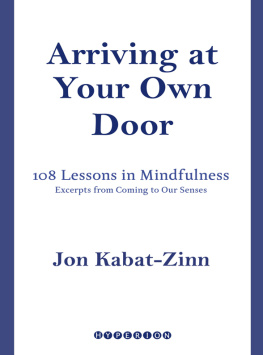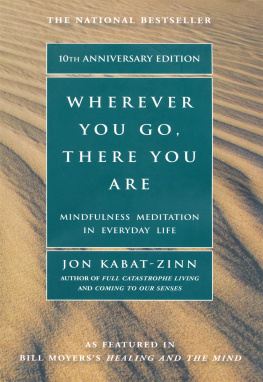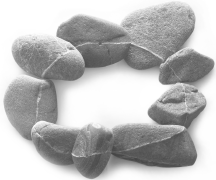Contents
Introduction
The Challenge of a Lifes Timeand a Lifetime
PART 1
MEDITATION: Its Not What You Think
PART 2
THE POWER OF ATTENTION AND THE DIS-EASE OF THE WORLD
PART 3
THE SENSORY WORLD: Your One Wild and Precious Lifey
PART 4
EMBRACING FORMAL PRACTICE: Tasting Mindfulness
PART 5
HEALING POSSIBILITIES: The Realm of Mind and Body
PART 6
ARRIVING AT YOUR OWN DOOR
PART 7
HEALING THE BODY POLITIC
PART 8
LET THE BEAUTY WE LOVE BE WHAT WE DO
It may be when we no longer know what to do,
we have come to our real work,
and that when we no longer know which way to go,
we have begun our real journey.
W ENDELL B ERRY
I dont know about you, but for myself, it feels like we are at a critical juncture of life on this planet. It could go any number of different ways. It seems that the world is on fire and so are our hearts, inflamed with fear and uncertainty, lacking all conviction, and often filled with passionate but unwise intensity. How we manage to see ourselves and the world at this juncture will make a huge difference in the way things unfold. What emerges for us as individuals and as a society in future moments will be shaped in large measure by whether and how we make use of our innate and incomparable capacity for awareness in this moment. It will be shaped by what we choose to do to heal the underlying distress, dissatisfaction and outright dis-ease of our lives and of our times, even as we nourish and protect all that is good and beautiful and healthy in ourselves and in the world.
The challenge is one of coming to our senses, both individually and as a species. I think it is fair to say that there is considerable movement in that direction worldwide, with little noticed and even less understood rivulets and streams of human creativity and goodness and caring feeding into growing rivers of openhearted wakefulness and compassion and wisdom. Where the adventure is taking us as a species, and in our individual private lives, even from one day to the next, is unknown. The destination of this collective journey we are caught up in is neither fixed nor predetermined, which is to say there is no destination, only the journey itself. What we are facing now and how we hold and understand this moment shapes what might emerge in the next moment, and the next, and shapes it in ways that are undetermined and, when all is said and done, undeterminable, mysterious.
But one thing is certain: This is a journey that we are all on, everybody on the planet, whether we like it or not; whether we know it or not; whether it is unfolding according to plan or not. Life is what it is about, and the challenge of living it as if it really mattered. Being human, we always have a choice in this regard. We can either be passively carried along by forces and habits that remain stubbornly unexamined and which imprison us in distorting dreams and potential nightmares, or we can engage in our lives by waking up to them and participating fully in their unfolding, whether we like what is happening in any moment or not. Only when we wake up do our lives become real and have even a chance of being liberated from our individual and collective delusions, diseases, and suffering.
Years ago, a meditation teacher opened an interview with me on a ten-day, almost entirely silent retreat by asking, How is the world treating you? I mumbled some response or other to the effect that things were going OK. Then he asked me, And how are you treating the world?
I was quite taken aback. It was the last question I was expecting. It was clear he didnt mean in a general way. He wasnt making pleasant conversation. He meant right there, on the retreat, that day, in what may have seemed to me at the time like little, even trivial ways. I thought I was more or less leaving the world in going on this retreat, but his comment drove home to me that there is no leaving the world, and that how I was relating to it in any and every moment, even in this artificially simplified environment, was important, in fact critical to my ultimate purpose in being there. I realized in that moment that I had a lot to learn about why I was even there in the first place, what meditation was really all about, and underlying it all, what I was really doing with my life.
Over the years, I gradually came to see the obvious, that the two questions were actually different sides of the same coin. For we are in intimate relationship with the world in all our moments. The give-and-take of that relationality is continually shaping our lives. It also shapes and defines the very world in which we live and in which our experiences unfold. Much of the time, we see these two aspects of life, how the world is treating me and how I am treating the world, as independent. Have you noticed how easily we can get caught up in thinking of ourselves as players on an inert stage, as if the world were only out there and not also in here? Have you noticed that we often act as if there were a significant separation between out there and in here, when our experience tells us that it is the thinnest of membranes, really no separation at all? Even if we sense the intimate relationship between outer and inner, still, we can be fairly insensitive to the ways our lives actually impinge upon and shape the world and the ways in which the world shapes our lives in a symbiotic dance of reciprocity and interdependence on every level, from intimacy with our own bodies and minds and what they are going through, to how we are relating to our family members; from our buying habits to what we think of the news we watch or dont watch on TV, to how we act or dont act within the larger world of the body politic.
That insensitivity is particularly onerous, even destructive, when we attempt, as we so often do, to force things to be a certain way, my way, without regard for the potential violence, even on the tiniest but still significant scale, that such a break in the rhythm of things carries with it. Sooner or later, such forcing denies the reciprocity, the beauty of the give-and-take and the complexity of the dance itself; we wind up stepping, wittingly or unwittingly, on a lot of toes. Such insensitivity, such out-of-touchness, isolates us from our own possibilities. In refusing to acknowledge how things actually are in any moment, perhaps because we dont want them to be that way, and in attempting to compel a situation or a relationship to be the way we want it to be out of fear that otherwise we may not get our needs met, we are forgetting that most of the time we hardly know what our own way really is; we only think we do. And we forget that this dance is one of extraordinary complexity as well as simplicity, and that new and interesting things happen when we do not collapse in the presence of our fears, and instead stop imposing and start living our truth, well beyond our limited ability to assert tight control over anything for very long.
As individuals and as a species, we can no longer afford to ignore this fundamental characteristic of our reciprocity and interconnectedness, nor can we ignore how interesting new possibilities emerge out of our yearnings and our intentions when we are, each in our own way, actually true to them, however mysterious or opaque they may at times feel to us. Through our sciences, through our philosophies, our histories, and our spiritual traditions, we have come to see that our health and well-being as individuals, our happiness, and actually even the continuity of the germ line, that life stream that we are only a momentary bubble in, that way in which we are the life-givers and world-builders for our future generations, depend on how we choose to live our own lives while we have them to live.


